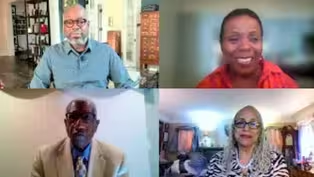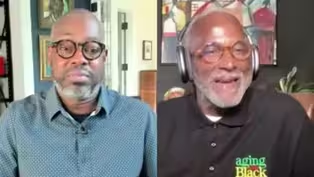
Financial, legal and self-care experts share resources available to Michigan caregivers
Clip: Season 53 Episode 28 | 8m 43sVideo has Closed Captions
Financial, legal and self-care experts share resources available to Michigan caregivers.
"American Black Journal" host Stephen Henderson talks with Hannan Center Executive Director Vincent Tilford, Watson Financial Group Wealth Advisor André Watson, and Jason Lachowski, the associate state director of government affairs for AARP Michigan, about financial, legal and respite resources for caregivers. Plus, they discuss some of the current bottlenecks in the caregiving industry and where
Problems playing video? | Closed Captioning Feedback
Problems playing video? | Closed Captioning Feedback
American Black Journal is a local public television program presented by Detroit PBS

Financial, legal and self-care experts share resources available to Michigan caregivers
Clip: Season 53 Episode 28 | 8m 43sVideo has Closed Captions
"American Black Journal" host Stephen Henderson talks with Hannan Center Executive Director Vincent Tilford, Watson Financial Group Wealth Advisor André Watson, and Jason Lachowski, the associate state director of government affairs for AARP Michigan, about financial, legal and respite resources for caregivers. Plus, they discuss some of the current bottlenecks in the caregiving industry and where
Problems playing video? | Closed Captioning Feedback
How to Watch American Black Journal
American Black Journal is available to stream on pbs.org and the free PBS App, available on iPhone, Apple TV, Android TV, Android smartphones, Amazon Fire TV, Amazon Fire Tablet, Roku, Samsung Smart TV, and Vizio.
Providing Support for PBS.org
Learn Moreabout PBS online sponsorshipI take care of the rest of her day.
- Financial and legal support as well as adequate self-care are critical for family caregivers, but a lot of people don't know where or how to access these services.
Here now to talk about practical help for caregivers are Vincent Tilford.
He is the executive director at the Hannan Center, wealth advisor, Andre Watson, of the Watson Financial Group, and Jason Lachowski, who is Associate State Director of Government Affairs at AARP of Michigan.
Thanks for being here, all three of you.
Vincent, talk about the respite services that are offered at Hannan Center for Camp Family Caregivers.
Why is that so important to care for yourself?
- Well, thanks, Stephen, for having me on.
I mean, first of all, I'll say that Hannan turns 100 years old this year and we've been serving the needs of older adults for this entire period.
But we really didn't start services for caregivers until about five years ago during the middle of the pandemic.
And one of the things that we discovered when we were creating this program was that there wasn't enough adult day programs for people who are living with a dementia diagnosis and one that also equally supports those caregivers.
And so, while we provide this sort of nurturing and sort of evidence-based programming to people who have a dementia diagnosis, we've spent an equal amount of time, if not more, with those caregivers.
Your earlier guests talked about sometimes how caregivers have to take care of themselves.
Well, we really try to help them with that by taking on some of the tasks that they have to do throughout the day and doing those for them.
We provide quarterly caregiving days, or I should say spa days, where caregivers can come and get pampered while we watch their family members in our program.
We help caregivers navigate resources, we provide counseling, and we help to place them when their loved one is no longer appropriate for our program.
We stay with them, and we help them to find other care that better fits those needs.
So, we are just a program that is oversubscribed.
We serve about 80 to 90 caregivers and those living with dementia on an annual basis.
- Andre, you provide financial advice for our aging population as well as for the family members who care for them.
That's key as well.
Talk about what we do.
I mean, almost no one prepares for this kind of stage in their life, especially caregivers.
What are the things people need to kind of keep their eyes open about?
- Great seeing you again, Stephen.
The one thing is just an awareness that I really applaud Dr. Hubbard for alerting and trying to create a proactive position from a trusted component of our community, the churches, because it gives me a better chance to do what I have to do, which is bring the resources necessary to pull off the care or the ingenuity and creativity that's necessary.
An example would be what type of home should mom or dad own?
What should we do with the inevitable situations that may occur?
Do we engage products such as long-term care?
And we have frank conversations with family members about how they can support that loved one that's in need.
- And when we think about the money side of it, I mean, is there a way to prepare for this?
I mean, are there decisions that we ought to be making in our forties and fifties to care for our parents first when they're in their seventies and eighties, but then also to make sure that we can be cared for when we reach that age?
- Yeah, and actually you highlight the bottleneck dilemma that I commonly confront.
Do you provide all of the resources to take care of the parent?
And is there a compromise in the inheritance?
What role does this care take economically?
Can you stop your job?
All of these situations are, unfortunately, realities that we have to figure out a plan and work accordingly.
Another thing, Stephen, that you mentioned is very, very critical.
We have to learn and evolve.
So, if we watch the care that we're providing for our parents, it is critical that we learn from the revelation that we may experience and learn, I guess, with the element of commitment.
You know, what can I do better that allows me to experience my fourth quarter or those twilight years at a better situation?
You know?
And sometimes that's mental, sometimes that's physical.
But it is critical that we learn.
And unfortunately, due to the disproportionate amount of experiences with wealth in America, the African American community is really going through a crisis in this critical time where some of the gains that we may have experienced could be lost or wiped out complete.
So, actually, it's a very challenging bottleneck that I am witnessing because I'm the individual who's in the room, we make the decisions.
Or I may see some of my clients who are not living their best lives, which, again, is why I applaud the vision that Dr. Hubbard is giving back to the community.
Because this is something we have to stay ahead of if we hope to at least give decency.
And I pray that our community, not just community but our country, comes to realize and own this emergency.
- Jason, talk about the tax and financial relief efforts that AARP is pushing for caregivers here in Michigan and at the national level.
- Well, thank you for having me, Stephen.
AARP is the nation's largest nonprofit, nonpartisan organization dedicated to empowering Americans 50 and older to choose how they live as they age.
And one of the ways we do that is through our advocacy work.
And one of our top priorities is providing financial relief to family caregivers.
We do that at both the federal level, Credit for Caring, but AARP Michigan is also working to advance a state tax credit as well.
This is a major issue for older adults.
At any given time during the year, there's an estimated 1.73 million Michiganders who serve as a caregiver for an older adult, allowing them to live at home, where they want to be.
Caregivers are the single largest provider of long-term care for adults living at home.
And they're the first line of defense for older adults from being readmitted to a hospital or being forced to move into a nursing home.
At AARP Michigan, we're very optimistic about the prospects of a credit.
The legislature is currently in its appropriations process, and the Senate has included a $30-million line item to start the credit.
We've been advocating to the Michigan House, a State House representative, and we hope to introduce the credit formally here in the coming months.
- Yeah.
I mean, that credit would make a big difference, obviously.
Are there other things that we need, from a policy perspective, to kind of change the financial picture for the caregiving environment beyond tax credits?
- You know, that's a great question and one of the things that I always point to is the funding that the states provide to the area agencies on aging for home and community-based services.
These are services that are provided through those area agencies.
They allow older adults to stay in their homes, which is where they want to be, and the services are more cost-effective than being at a nursing home.
- And you can see the entire hour-long caregiving town hall at americanblackjournal.org.
Plus, the caregiving documentary is available on demand at pbs.org.
‘100 Caring Congregations’ initiative provides training and resources to church leaders
Video has Closed Captions
Clip: S53 Ep28 | 7m 16s | 100 Caring Congregations project trains Black church leaders to be caregiving advocates. (7m 16s)
'Aging While Black' Author Raymond Jetson discusses his new book and caring for Black elders
Video has Closed Captions
Clip: S53 Ep28 | 7m 53s | “Aging While Black” author Raymond Jetson talks about caregiving in the Black community. (7m 53s)
Providing Support for PBS.org
Learn Moreabout PBS online sponsorshipSupport for PBS provided by:
American Black Journal is a local public television program presented by Detroit PBS













